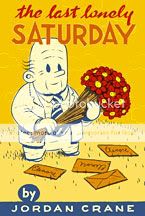
The Last Lonely Saturday
Jordan Crane, writer/artist
Red Ink, 2000
80 pages, hardcover
$8
Buy it from Fantagraphics
Originally published at The Savage Critics on March 16, 2009.
I find it both impossible and undesirable to separate The Last Lonely Saturday from the pivotal role it played in my life as a comics reader, and thus in my life in general. During the year 2001 I took a job as an editor at the A&F Quarterly, Abercrombie & Fitch’s big giant magazine/catalog/softcore porn hybrid publication. My boss there, Savas Abadsidis, was and is a big fanboy, and a chance encounter with a Wizard magazine on his desk, which contained an article teasing an upcoming revamp of the X-Men by Grant Morrison (whom I remembered favorably from my days as a comics reader in high school for Arkham Asylum) and Frank Quitely, led me into Jim Hanley’s Universe on 33rd Street to track down the series. This was the first time I’d entered a comic shop to purchase anything that wasn’t either an isolated Acme Novelty Library, Savage Dragon, or Frank Miller comic in years–the birth of my modern comics readership.
Intrigued by the offerings on hand, and empowered by a complete lack of editorial oversight that enabled us to write about anything we wanted in the Quarterly–not to mention Abercrombie’s expense account–I made a solemn vow to buy something completely unfamiliar to me every week. Jordan Crane’s The Last Lonely Saturday was one of my first such purchases. From there it was a short journey to Crane’s anthology NON, his distributor Highwater Books, the Fort Thunder aesthetic in general, and thence all of alternative comics.
None of that was likely to happen if I didn’t just love The Last Lonely Saturday to pieces. And that itself might seem unlikely. It’s a slight book–many of its 80 pages are endpapers, and the rest contain all of two panels apiece. Dialogue is minimal; the majority of it of it comes from a little boy’s triplet proclamations: “It’s a man,” “Look man run,” “Ha ha! Windy!” It has a simple red, white, and orange color scheme. Although a ghost is involved and a character dies, we’re pretty far from the violent morality plays that make up much of Crane’s recent work.
What The Last Lonely Saturday is is a love story, a romantic fable. To some eyes, it might be a creepy one at that. In the tradition of the Police’s “Every Breath You Take,” albeit in something of a gender reversal from that song, Saturday could be looked at as a depiction of the role fixation and selfishness, even emotional violence, frequently play in love. But just as the sweeping, insistent, intimate, evocative sound of “Every Breath You Take” make it one of the great love songs regardless of the obsessive lyrics, so too the particulars of The Last Lonely Saturday make it pretty much the best love story in comics form I’ve ever come across. Crane’s character designs are at their most adorable here. His jolly little potato-shaped protagonist, with his rumpled suit and charmingly crinkled brow, looks like the grandpa of our collective unconscious made real. His beloved Elenore’s jaunty hairdo, long eyelashes, and high-wattage smile evoke beauty and charm that transcends her cartoony form, while her two lines of flashback dialogue upon receiving flowers from her beau (“Oh sweet heart! They’re just lovely!”) nail me to the floor with sweetness every time. Everything seems airy–leaves and papers float and twirl in the breeze, the little old man’s car jauntily jumps along the road, puffy white clouds are a constant presence in the background–until, at the story’s moment of truth, Crane weighs down his line and crumples his art toward the center of the panel. I’m a huge, huge sucker for emotionally devastated old men, so imagine my utter joy when our hero is granted a reunion with his dear Elenore! (Think the video for Blur’s “Coffee & TV” and you’ve pretty much got it.) At that point, it doesn’t matter to me how it happened–that it did happen is what’s important, and that Elenore understands this is what makes The Last Lonely Saturday a great love story, in that it appreciates that what can seem unpleasant to outsiders is, within that world of two, an act of grace. It’s an intelligent, moving, beautiful, terrific little comic.
Tags: comics, comics reviews, Comics Time, reviews
